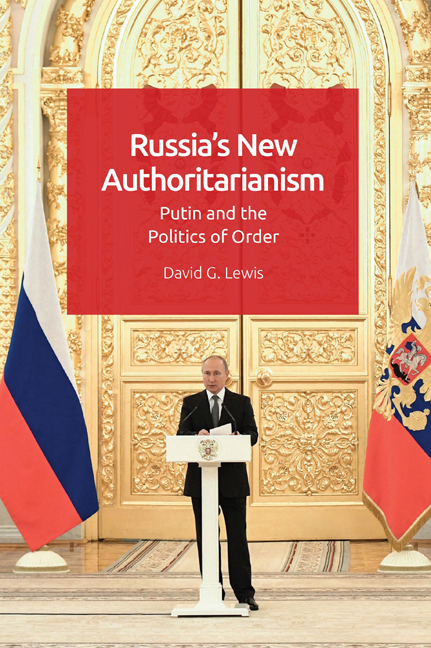Book contents
- Frontmatter
- Contents
- Preface
- Acknowledgements
- Note on Transliteration and Translation
- One Authoritarianism, Ideology and Order
- Two Carl Schmitt and Russian Conservatism
- Three Sovereignty and the Exception
- Four Democracy and the People
- Five Defining the Enemy
- Six Dualism, Exceptionality and the Rule of Law
- Seven The Crimean Exception
- Eight Großraum Thinking in Russian Foreign Policy
- Nine Apocalypse Delayed: Katechontic Thinking in Late Putinist Russia
- Conclusion
- Bibliography
- Index
Six - Dualism, Exceptionality and the Rule of Law
- Frontmatter
- Contents
- Preface
- Acknowledgements
- Note on Transliteration and Translation
- One Authoritarianism, Ideology and Order
- Two Carl Schmitt and Russian Conservatism
- Three Sovereignty and the Exception
- Four Democracy and the People
- Five Defining the Enemy
- Six Dualism, Exceptionality and the Rule of Law
- Seven The Crimean Exception
- Eight Großraum Thinking in Russian Foreign Policy
- Nine Apocalypse Delayed: Katechontic Thinking in Late Putinist Russia
- Conclusion
- Bibliography
- Index
Summary
Auctoritas, non veritas, facit legem [Authority, not truth, makes law]
Thomas Hobbes, LeviathanWhen President Putin won his first presidential elections, in 2000, he promised voters a revolution in legality, the creation of a law-based state (Putin 2000c). He wrote in 2000 that ‘the law should govern all of us, from the representatives of power to the ordinary citizen’. From now on, the police, prosecutors, politicians and oligarchs would all be subject to the same rules (Putin 2000c). Relations between the state and powerful oligarchs would be no different from relations with ‘the owner of a small bakery or a shoe-repair shop’ (Putin 2000c). A new criminal code was introduced in 2001, judges’ salaries were increased, courts were reformed and better funded. Businesses increasingly turned to the courts rather than criminal gangs to resolve disputes (Gans-Morse 2017). In many areas of everyday law, local courts were efficient and reasonably fair (Hendley 2017), while at the highest level of the judiciary, the Russian Constitutional Court frequently challenged unconstitutional laws and decrees (Trochev and Solomon 2018: 201).
Despite these apparent successes, in the World Justice Project's Rule of Law Index, Russia was listed in 89th position out of 113 countries, and was one of the worst-ranked states in relation to its GDP.Russia scored among the lowest 20 per cent of all states for rule of law in the Worldwide Governance Indicators (WGI) dataset. Perceptions of Russia's judiciary were coloured by a series of highly politicised cases against Mikhail Khodorkovsky, Alexei Navalny and other political opponents of the Putin regime. Thousands of Russians flocked to the European Court of Human Rights (ECtHR) in Strasbourg to seek redress unavailable in the Russian judicial system (Mälksoo and Benedek 2017). Unwilling to trust Russian justice, Russia's oligarchs and business leaders became lucrative clients for London law firms and the English courts. President Dmitry Medvedev admitted that Russia was plagued by ‘legal nihilism’ (Medvedev 2008).
This chapter explores these apparent contradictions, building on a growing literature that considers law in Russia as a dualistic domain (Sakwa 2010a, 2010b, 2013; Hendley 2017; Trochev 2017; Paneyakh and Rosenberg 2018; Trochev and Solomon 2018).
- Type
- Chapter
- Information
- Russia's New AuthoritarianismPutin and the Politics of Order, pp. 117 - 138Publisher: Edinburgh University PressPrint publication year: 2020



